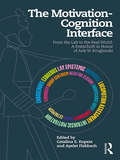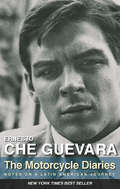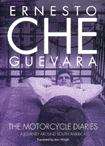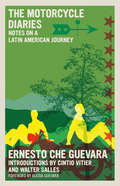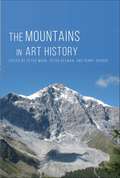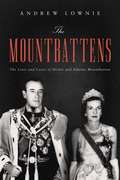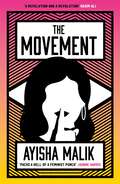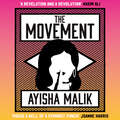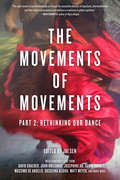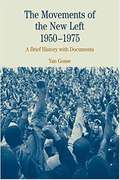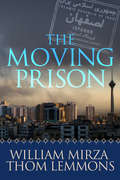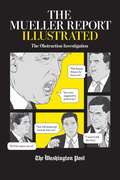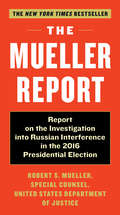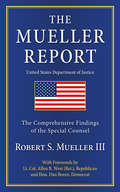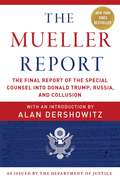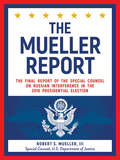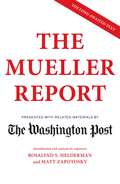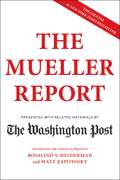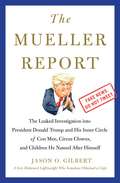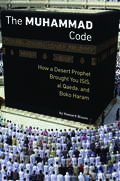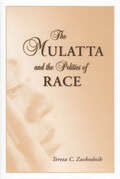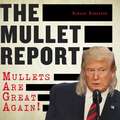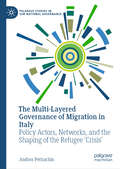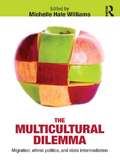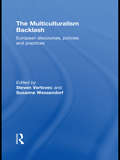- Table View
- List View
The Motivation-Cognition Interface: From the Lab to the Real World: A Festschrift in Honor of Arie W. Kruglanski
by Catalina E. Kopetz Ayelet FishbachThis volume honors the work of Arie W. Kruglanski. It represents a collection of chapters written by Arie’s former students, friends, and collaborators. The chapters are rather diverse and cover a variety of topics from politics, including international terrorism, to health related issues, such as addiction and self-control, to basic psychological principles, such as motivation and self-regulation, the formation of attitudes, social influence, and interpersonal relationships. What these chapters have in common is that they have all been inspired by Arie’s revolutionary work on human motivation and represent the authors’ attempt to apply the basic principles of motivation to the understanding of diverse phenomena.
The Motorcycle Diaries
by Ernesto Che Guevara Aleida GuevaraThe book of the popular movie STARRING GAEL GARCIA BERNALNOW A NEW YORK TIMES BESTSELLERThe young Che Guevara's lively and highly entertaining travel diary, now a popular movie and a New York Times bestseller. This new, expanded edition features exclusive, unpublished photos taken by the 23-year-old Ernesto on his journey across a continent, and a tender preface by Aleida Guevara, offering an insightful perspective on the man and the icon."A journey, a number of journeys. Ernesto Guevara in search of adventure, Ernesto Guevara in search of America, Ernesto Guevara in search of Che. On this journey of journeys, solitude found solidarity, 'I' turned into 'we'."--Eduardo Galeano"When I read these notes for the first time, I was quite young myself and I immediately identified with this man who narrated his adventures in such a spontaneous manner... To tell you the truth, the more I read, the more I was in love with the boy my father had been."--Aleida Guevara"Our film is about a young man, Che, falling in love with a continent and finding his place in it." --Walter Salles, director of "The Motorcycle Diaries.""As his journey progresses, Guevara's voice seems to deepen, to darken, colored by what he witnesses in his travels. He is still poetic, but now he comments on what he sees, though still poetically, with a new awareness of the social and political ramifications of what's going on around him."--January MagazineAlso available in Spanish: DIARIOS DE MOTOCICLETA (978-1-920888-11-4)Features of this edition include:--A preface by Che Guevara's daughter Aleida--Introduction by Cintio Vintier, well-known Latin American poet--Photos & maps from the original journey--Che's personal reflections on his formative years: "A child of my environment."Published in association with the Che Guevara Studies Center, Havana
The Motorcycle Diaries: A Journey around South America
by Anne Wright Ernesto Che GuevaraThe diaries are written by Che Guevara during his riotous motorcycle odyssey around South America at the age of twenty-three.
The Motorcycle Diaries: Notes on a Latin American Journey
by Ernesto Che GuevaraA New York Times bestsellerWith a new introduction by The Motorcyle Diaries filmmaker Walter Salles, and featuring 24 pages of photos taken by Che.The Motorcycle Diaries is Che Guevara's diary of his journey to discover the continent of Latin America while still a medical student, setting out in 1952 on a vintage Norton motorcycle together with his friend Alberto Granado, a biochemist. It captures, arguably as much as any book ever written, the exuberance and joy of one person's youthful belief in the possibilities of humankind tending towards justice, peace and happiness. After the release in 2004 of the exhilarating film of the same title, directed by Walter Salles, the book became a New York Times and international bestseller. This edition includes a new introduction by Walter Salles and an array of new material that was assembled for the 2004 edition coinciding with the release of the film, including 24 pages of previously unpublished photos taken by Che, notes and comments by his wife, Aleida Guevara March, and an extensive introduction by the distinguished Cuban author, Cintio Vitier."A journey, a number of journeys. Ernesto Guevara in search of adventure, Ernesto Guevara in search of America, Ernesto Guevara in search of Che. On this journey, solitude found solidarity. 'I' turned into 'we.'"—Eduardo Galeano"As his journey progresses, Guevara's voice seems to deepen, to darken, colored by what he witnesses in his travels. He is still poetic, but now he comments on what he sees, though still poetically, with a new awareness of the social and political ramifications of what's going on around him."—January Magazine"Our film is about a young man, Che, falling in love with a continent and finding his place in it."—Walter Salles, director of the film version of The Motorcycle Diaries"All this wandering around 'Our America with a Capital A' has changed me more than I thought."—Ernesto Che Guevara, from The Motorcycle Diaries
The Mountains in Art History
by Peter Mark ; Peter Helman ; Penny SnyderThe Mountains in Art History is the first English-language work to focus on mountains as subject matter and source of aesthetic and spiritual inspiration for painters. This collection of original essays is written entirely by Wesleyan University students of art history. The essays examine how artistic representation of mountains has varied through the lens of specific depictions in English and American literature, and consider how images of mountains functioned in conjunction with religion, the sublime, and Romanticism. These essays by student authors adeptly ruminate on works by individuals such as William Wordsworth, John Frederick Kensett, Alexander van Humboldt, Emil Nolde, and Arnold Fanck. Includes an introduction by professor Peter Mark and a helpful appendix of the course syllabus and narrative description.
The Mountbattens: The Lives and Loves of Dickie and Edwina Mountbatten
by Andrew LownieThe intimate story of a unique marriage spanning the heights of British glamour and power that descends into infidelity, manipulation, and disaster through the heart of the twentieth century.DICKIE MOUNTBATTEN: A major figure behind his nephew Philip's marriage to Queen Elizabeth II and instrumental in the royal family taking the Mountbatten name, he was Supreme Allied Commander of South East Asia during World War II and the last Viceroy of India. EDWINA MOUNTBATTEN: Once the richest woman in Britain—and a playgirl who enjoyed numerous affairs—she emerged from World War II as a magnetic and talented humanitarian worker who was loved throughout the world. From British high society to the South of France, from the battlefields of Burma to the Viceroy's House, The Mountbattens is a rich and filmic story of a powerful partnership, revealing the truth behind a carefully curated legend. Was Mountbatten one of the outstanding leaders of his generation, or a man over-promoted because of his royal birth, high-level connections, film-star looks and ruthless self-promotion? What is the true story behind controversies such as the Dieppe Raid and Indian Partition, the love affair between Edwina and Nehru, and Mountbatten's assassination in 1979?
The Movement: 'packs a hell of a feminist punch'
by Ayisha Malik'Original, clever, insightful and packs a hell of a feminist punch. I loved it' Joanne Harris'A revelation and a revolution' Kasim AliWith words come power. But do you speak out or shut up? Everywhere Sara Javed goes - online or outside - everyone is shouting about something. Couldn't they all just shut up? One day she takes her own advice.At first people don't understand her silence and are politely confused at best. But the last thing Sara could anticipate is becoming the figurehead of a global movement that splits society in two.The Silent Movement sparks outrage in its opposers. Global structures start to shift. And the lives of those closest to Sara - as well as strangers inspired by her act - begin to unravel.It's time for the world to reconsider what it means to have a voice. A sharply observed novel, charged with compassion and dark wit, that will spark important conversations about how we live, relate and communicate now.#SILENCEISPOWER---READERS ARE CAPTIVATED BY THE MOVEMENT'Brilliant and thought-provoking''A novel about choices and how women's choices are always subject to critics''Zainab's story will stay with me for years to come''There is a lot to be learnt from this work of fiction''Essential reading''Perfect for this age of noise''A very compelling read'
The Movement: how far will she go to make her voice heard?
by Ayisha Malik'Powerful and profound' Daisy Buchanan'Breathtakingly original... a searing examination of the modern world and its sensibilities' Imran Mahmood__With words come power. But do you speak out or shut up? Everywhere Sara Javed goes - online or outside - everyone is shouting about something. Couldn't they all just shut up? One day she takes her own advice.At first people don't understand her silence and are politely confused at best. But the last thing Sara could anticipate is becoming the figurehead of a global movement that splits society in two.The Silent Movement sparks outrage in its opposers. Global structures start to shift. And the lives of those closest to Sara - as well as strangers inspired by her act - begin to unravel.It's time for the world to reconsider what it means to have a voice. A sharply observed novel, charged with compassion and dark wit, that will spark important conversations about how we live, relate and communicate now.__'Malik makes us care with wry humour and bite' Helen Lederer'A book for, and of, the now' Vaseem Khan
The Movements of Movements: Part 2: Rethinking Our Dance
by Jai SenThis collection provides a bracing window into some of the central ideas to have emerged from within grassroots struggles from 2006 to 2010. Rethinking Our Dance, the second of two volumes, offers a wide range of essays from frontline activists in Afghanistan, Argentina, Brazil, Niger, and Taiwan, as well as from Europe and North America that address the question, "What do we need to do in order to bring about justice and peace?" Contributors include Kolya Abramsky, Ezequiel Adamovsky, Oussenia Alidou, Samir Amin, Chris Carlsson, John Brown Childs, Lee Cormie, Anila Daulatzai, Massimo De Angelis, The Free Association, David Graeber, Josephine Ho, John Holloway, François Houtart, Jeffrey Juris, Michael Löwy, Tomás Mac Sheoin, Matt Meyer, Muto Ichiyo, Rodrigo Nunes, Michal Osterweil, Shailja Patel, Geoffrey Pleyers, Stephanie Ross, and Nicola Yeates.
The Movements of the New Left, 1950-1975: A Brief History with Documents
by Van GosseTracking the developments and commonalities of the civil rights and black power movements, Movements of the New Left, 1950-1975 zeroes in on unrest in a variety of areas, from peace, antiwar, feminism, gay liberation, to other struggles by people of color.
The Moving Prison
by Thom Lemmons William MirzaThe year is 1979 and Ezra Solaiman and his family are trapped in a country in turmoil. Their homeland is increasingly ruled by Islamic fundamentalists who are becoming a law unto themselves. The Solaimans plan their escape only to have Ezra captured and imprisoned on trumped-up charges. Unsure just who his enemies are, Ezra is desperate for a way out--out of prison, out of Iran, out of the chaos his life has become. The Moving Prison is a riveting tale of revolution and revelation, of failure ... and faith.
The Mueller Report Illustrated: The Obstruction Investigation
by The Washington PostWritten and designed by the staff of The Washington Post and illustrated by artist Jan Feindt, The Mueller Report Illustrated: The Obstruction Investigation brings to life the findings of special counsel Robert S. Mueller III in an engaging and illuminating presentation.When it was released on April 18, 2019, Mueller&’s report laid out two major conclusions: that Russia&’s interference in the 2016 presidential election had been &“sweeping and systematic&” and that the evidence did not establish that Trump or his campaign had conspired with the Kremlin. The special counsel left one significant question unanswered: whether the president broke the law by trying to block the probe. However, Mueller unspooled a dramatic narrative of an angry and anxious president trying to control the criminal investigation, even after he knew he was under scrutiny. Deep inside the 448-page report is a fly-on-the-wall account of the inner workings of the White House, remarkable in detail and drama. With dialogue taken directly from the report, The Mueller Report Illustrated is a vivid, factually rigorous narrative of a crucial period in Trump&’s presidency that remains relevant to the turbulent events of today.
The Mueller Report: Report on the Investigation into Russian Interference in the 2016 Presidential Election
by Robert S. Mueller Special Counsel's Office Dept of JusticeThis may be the most anticipated publication in American history, a document that can actually have an impact on the very future of our democracy. <P><P>This is the full text of special counsel Robert Mueller's investigation into Russian interference in the 2016 presidential election. It is THE REPORT AND NOTHING BUT THE REPORT: presented as released by the Attorney General of the United States, with no positioning or framing apparatus -- such as a celebrity introduction -- that would give it bias or impede its clarity. <P><P>One of the most-talked-about investigations in American history, the subject of constant media discussion and speculation, non-stop and controversial attacks from the president, and the eager anticipation of a public wondering what the truth is, this long-awaited publication is an historic event. <P><b>A New York Times Bestseller</b>
The Mueller Report: The Comprehensive Findings of the Special Counsel
by Robert S. Mueller IIIThe historic report on the investigation into Russian interference in the 2016 presidential election—with forewords by two former congressmen. In the future, The Mueller Report may be judged as the most important document of our time. And no matter where you reside on the American political spectrum, you will probably agree that it will have far-reaching implications for the balance of power among the three coequal branches of government that create, administer, and apply the laws of our republic. This edition includes forewords by Lt. Col. Allen B. West (Ret.), and the Hon. Dan Boren, both former US congressmen. Having served on opposite sides of the aisle while Robert Mueller served as director of the FBI, they hold insight into the leadership of the organization created expressly to investigate the questions answered by this report.
The Mueller Report: The Final Report of the Special Counsel into Donald Trump, Russia, and Collusion
by Robert S. Mueller III Special Counsel's U.S. Department of JusticeThere has never been a more important political investigation than Robert S. Mueller III's into President Donald Trump's possible collusion with Russia. His momentous findings can be found here, complete with: <br>The 300+ pages of the historic report, as released by the Justice Department <br>An introduction by constitutional scholar, eminent civil libertarian, and New York Times bestselling author Alan Dershowitz. <P><P>The relevant portions of Title 28 of the Code of Federal Regulations, the 1999 provisions written by former acting Solicitor General Neal Katyal, which establish and regulate the powers of the special counsel. <P><P>Rod Rosenstein’s 2016 order appointing Robert Mueller III as special counsel and outlining the scope of his investigation. <P><P>Attorney General William Barr’s four-page summary of the report, as sent to Congress. <P><P>Barr's explanation of the four reasons for redacting the report, and a key for identifying them in the color-coded report <P><P>The wait is over. Robert Mueller, a lifelong Republican, has concluded his investigation and submitted its findings to Attorney General William Barr. Barr has told Congress that Mueller found no proof of collusion between the Trump campaign and Russia, and did not come to a conclusion on obstruction of justice—neither concluding the president committed a crime nor exonerating him. But Mueller’s report was over 300 pages and Barr’s summary was only four pages, raising questions about the conclusions of a historic investigation. <P><P>Special Counsel Robert Mueller III’s probe into Russian influence on the 2016 election of Donald Trump—including links between the campaign and Russian interests, obstruction of justice by President Trump, and any other matters that may have arisen in the course of the investigation—has been the focal point of American politics since its inception in May 2017. Democrats in the US House of Representatives hoped to use the report to begin impeachment proceedings, with the support of those critical of the president. Media tracked Mueller’s every move, and the investigation was subject to constant speculation by political pundits everywhere. It resulted in the indictments of Michael Flynn, Paul Manafort, Roger Stone, and many others. President Trump and his supporters affirmed that the investigation was a “witch hunt” and the product of a plot by the political establishment—the “deep state”—to delegitimize his presidency. <P><P> Mueller’s findings—at least according to Barr—allowed the latter to claim victory. But now, thanks to a subpoena from House Judiciary Committee chairman Jerry Nadler for the full report, a resolution from the House of Representatives to release the full report to the public (though blocked in the Senate by Mitch McConnell), and popular demand, it’s time for public to judge if that is true. The Mueller investigation will join Watergate, and the Mueller Report will join the 9/11 Commission Report, the Warren Report, and the Starr Report, as one of the most important in history. The Mueller Report is required reading for everyone with interest in American politics, for every 2016 and 2020 voter, and every American. It’s now available here as an affordable paperback, featuring an introduction from eminent civil libertarian, Harvard Law Professor Emeritus, and New York Times bestselling author Alan Dershowitz, who provides a constitutional, civil law-based commentary sorely needed in today’s media landscape. <P><b>A New York Times Bestseller</b>
The Mueller Report: The Final Report of the Special Counsel on Russian Interference in the 2016 Presidential Election
by Robert S. Mueller IIIThis is the full Mueller Report, as released on April 18, 2019, by the U.S. Department of Justice. A reprint of the report exactly as it was issued by the government, it is without analysis or commentary from any other source and with nothing subtracted except for the material redacted by the Department of Justice. The mission of the Mueller investigation was to examine Russian interference in the 2016 Presidential election, consisting of possible links, or "collusion," between the Donald Trump campaign and the Russian government of Vladimir Putin as well as any allegations of obstruction of justice in this regard. It was also intended to detect and prosecute, where warranted, any other crimes that surfaced during the course of the investigation. The report consists of a detailed summary of the various investigations and inquiries that the Special Counsel and colleagues carried out in these areas. The investigation was initiated in the aftermath of the firing of FBI Director James Comey by Donald Trump on May 9, 2017. The FBI, under Director Comey, had already been investigating links between Russia and the Trump campaign. Mueller submitted his report to Attorney General William Barr on March 22, 2019, and the Department of Justice released the redacted report one month later.
The Mueller Report: The Full Report On The Investigation Into Russian Interference In The 2016 Presidential Election
by The Washington PostThe only book with exclusive analysis by the Pulitzer Prize-winning staff of The Washington Post, and the most complete and authoritative available.Read the findings of the Special Counsel's investigation into Russian interference in the 2016 election, complete with accompanying analysis by the Post reporters who've covered the story from the beginning. This edition from The Washington Post contains: * The long-awaited report* An introduction by The Washington Post titled 'A President, a Prosecutor, and the Protection of American Democracy'* A timeline of the major events of the Special Counsel's investigation from May 2017, when Robert Mueller was appointed, to the present day* A guide to individuals involved, including in the Special Counsel's Office, the Department of Justice, the FBI, the Trump Campaign, the White House, the Trump legal defence team and the Russians* Key documents in the Special Counsel's investigation, including filings pertaining to General Michael T. Flynn, Paul Manafort, Michael Cohen, Roger Stone and the Russian internet operation in St Petersburg. Each document is introduced and explained by Washington Post reporters.One of the most urgent and important investigations ever conducted, the Mueller inquiry focuses on Donald Trump, his presidential campaign and Russian interference in the 2016 election, and draws on the testimony of dozens of witnesses and the work of some of the country's most seasoned prosecutors.The special counsel's investigation looms as a turning point in American history. The Mueller Report is essential reading for all those concerned about the fate of the presidency and the future of democracy.
The Mueller Report: The Full Report On The Investigation Into Russian Interference In The 2016 Presidential Election
by The Washington PostONE OF TIME&’S 100 BEST BOOKS OF THE YEAR The Crucial #1 New York Times Bestseller &“The Mueller report is that rare Washington tell-all that surpasses its pre-publication hype…the best book by far on the workings of the Trump presidency.&” —Carlos Lozada, The Washington Post The only book with exclusive analysis by the Pulitzer Prize–winning staff of The Washington Post, and the most complete and authoritative available.Read the findings of the Special Counsel&’s investigation into Russian interference in the 2016 election, complete with accompanying analysis by the Post reporters who&’ve covered the story from the beginning. This edition from The Washington Post/Scribner contains: —The long-awaited Report On The Investigation Into Russian Interference In The 2016 Presidential Election —An introduction by The Washington Post titled &“A President, a Prosecutor, and the Protection of American Democracy&” —A timeline of the major events of the Special Counsel&’s investigation from May 2017, when Robert Mueller was appointed, to the report's delivery —A guide to individuals involved, including in the Special Counsel&’s Office, the Department of Justice, the FBI, the Trump Campaign, the White House, the Trump legal defense team, and the Russians —Key documents in the Special Counsel&’s investigation, including filings pertaining to General Michael T. Flynn, Paul Manafort, Michael Cohen, Roger Stone, and the Russian internet operation in St. Petersburg. Each document is introduced and explained by Washington Post reporters. One of the most urgent and important investigations ever conducted, the Mueller inquiry focuses on Donald Trump, his presidential campaign, and Russian interference in the 2016 election, and draws on the testimony of dozens of witnesses and the work of some of the country&’s most seasoned prosecutors. The special counsel&’s investigation looms as a turning point in American history. The Mueller Report is essential reading for all citizens concerned about the fate of the presidency and the future of our democracy.
The Mueller Report: The Leaked Investigation into President Donald Trump and His Inner Circle of Con Men, Circus Clowns, and Children He Named After Himself
by Jason O. GilbertThe president has gotten himself into a bit of trouble. Maybe you heard?The entire country is waiting to see what former FBI director and current special counsel Robert Mueller has dug up on former mail-order steak salesman and current US president Donald Trump. The wait is over—sort of—with the publication of The Mueller Report by Jason O. Gilbert. Leaked by an anonymous and vengeful White House source who goes only by the mysterious code name “Melania T.,” The Mueller Report is a hilarious inventory of the dirt, grime, and Big Mac crumbs that the special counsel has collected on President Trump during his months of investigation. Filled with interview transcripts, intercepted phone calls, incriminating emails, text exchanges, ALL-CAPS TRUMP TWEETS WITH SPELING ERRORS, and more, it whisks readers from the leaky White House to an even leakier Ritz-Carlton hotel room in Moscow, from Donald Trump Jr.’s covert meeting with Russians in Trump Tower to Michael Cohen’s secret sale of a Trump Tower apartment to a shell corporation called Oligarch LLC. And, for the first time, you’ll find out what really happened in that Moscow hotel room between Donald Trump and two well-hydrated Russian escorts. Bring an umbrella! Unlike the Trump presidency, The Mueller Report is so much fun you won’t want it to end. Read it right away, while books are still legal in America!
The Muhammad Code: How a Desert Prophet Brought You ISIS, al Qaeda, and Boko Haram
by Howard Bloom"If Howard Bloom is only ten percent right, we'll have to drastically revise our notions of the universe through the contagious joy of a great mind set loose on the biggest intellectual puzzles humans have ever faced. Whether you're a scientist or hyper-curious layperson, Bloom's argument will rock your world." -- Barbara Ehrenreich on Howard Bloom's The God ProblemOsama bin Laden called Mohammad "a Prophet of Conquest." Pakistan's Universal Sunnah Foundation brags that under Mohammad's battlefield leadership, "Islam spread an average of 317 square miles per day."Right now ISIS, al Qaeda, Boko Haram, and the Supreme Leader of Iran know that Islam toppled two of the biggest superpowers in history--Rome and Persia--then took over two-thirds of the inhabited world. Militant Muslims believe that Islam is on the brink of doing it again. The Muhammad Code: How a Desert Prophet Brought You ISIS, al Qaeda, and Boko Haram lays bare the origins of this profoundly dangerous belief.Many contemporary thinkers excuse Islamic violence as a legitimate reaction to Western imperialism. They blame America's wars in Iraq and Afghanistan and the establishment of Israel in 1948. But Jihad was invented in 624 AD by the only prophet ever to call himself "The Prophet of War." And that prophet was not responding to "legitimate grievances," but an ambition for world conquest.
The Mulatta and the Politics of Race
by Teresa C. ZackodnikFrom abolition through the years just before the civil rights struggle began, African American women recognized that a mixed-race woman made for a powerful and, at times, very useful figure in the battle for racial justice. The Mulatta and the Politics of Race traces many key instances in which black women have wielded the image of a racially mixed woman to assault the color line. In the oratory and fiction of black women from the late 1840s through the 1950s, Teresa C. Zackodnik finds the mulatta to be a metaphor of increasing potency. Before the Civil War white female abolitionists created the image of the “tragic mulatta,” caught between races, rejected by all. African American women put the mulatta to diverse political use. Black women used the mulatta figure to invoke and manage American and British abolitionist empathy and to contest racial stereotypes of womanhood in the postbellum United States. The mulatta aided writers in critiquing the “New Negro Renaissance” and gave writers leverage to subvert the aims of mid-twentieth-century mainstream American culture. The Mulatta and the Politics of Race focuses on the antislavery lectures and appearances of Ellen Craft and Sarah Parker Remond, the domestic fiction of Pauline Hopkins and Frances Harper, the Harlem Renaissance novels of Jessie Fauset and Nella Larsen, and the little-known 1950s texts of Dorothy Lee Dickens and Reba Lee. Throughout, the author discovers the especially valuable and as yet unexplored contributions of these black women and their uses of the mulatta in prose and speech.
The Mullet Report: Mullets Are Great Again!
by Ronald RedaktorDonald Trump Says Mullets Are Back, and They're Gonna Be YUGE! First it was The Mueller Report, and now, finally, the long-awaited Mullet Report is here, with all the shocking photos you've been waiting for. Long mullets, curly mullets, orange mullets . . . it's all here, with as few redactions as possible (without compromising national security and ongoing investigations). Robert Mueller investigated Russian collusion, but Ronald Redaktor will let you in on the secrets of the Hair Investigation. Find out about hair dumping and hacking operations, and decide for yourself if there was any brushin' collusion. Donald Trump's hair has long been the subject of intense scrutiny. We've heard a lot about obstruction of justice. Well, what is he hiding up there? Is it detachable? Why is it orange? In response, Trump has launched his own #MulletStyle campaign, which in itself has become the subject of conspiracy theories and in-depth investigation. Now you can separate fact from alternative fact with this newly released and highly anticipated Mullet Report.
The Multi-Layered Governance of Migration in Italy: Policy Actors, Networks, and the Shaping of the Refugee 'Crisis' (Palgrave Studies in Sub-National Governance)
by Andrea PettrachinThis book examines the various ways in which policymakers and political actors across different governmental levels have responded to the recent European refugee ‘crisis’, and the effects of these responses. Whereas previous studies have often focused on the discourses and policies implemented by national and local governments, this book shifts the focus to knowledge-formation and decision-making processes. Drawing on evidence from Italy – a country that has been centrally affected by the refugee ‘crisis’ – the book examines policy processes regarding asylum-seeking migration at sub-national, national and EU level. It argues that policymakers at all levels of government can be influenced by perceptions of public attitudes towards immigration, and that these perceptions are often divorced from objective evidence. The book will appeal to all those interested in multilevel governance, migration studies, public policy, and European politics.
The Multicultural Dilemma: Migration, Ethnic Politics, and State Intermediation
by Michelle Hale WilliamsThis work seeks to explore the contemporary challenge of government in multicultural societies, drawing together a wide range of contributors to examine how ethnic difference could better understood and mediated by modern nation states. Divided into three sections, the book centres round the notion that changing patterns of migration bring escalating obstacles to integration or assimilation. In the first section, contributors focus on the theory that immigrants are the actors that catalyze contemporary multicultural dilemmas within states, with a particular focus on diaspora and how a diaspora community may differ in some ways from other kinds of immigrant community. Section two identifies key factors in shaping ethnic identity before moving on to examine the state of the debate over whether identity can be changed or manipulated. The contributors to this section provide valuable insights into the catalysts and causes of ethnic division and tension, by showing factors in the development of ethnic identity. In the third section, the focus turns to strategies for mediating multicultural challenges and managing internal diversity in multicultural society, offering structural and institutional solutions with evidence of application in specific cases and country contexts. Offering a comprehensive overview of this pressing issue and drawing on a wide range of case studies, this work will be of interest to students and scholars of migration, political sociology & race and ethnic studies.
The Multiculturalism Backlash: European Discourses, Policies and Practices
by Steven Vertovec Susanne WessendorfIn a relatively short time, many European governments have been purposefully dropping the notion ‘multicultural’ or other references to cultural diversity in their policy vocabularies. More and more politicians and public intellectuals have criticized a perceived shift towards ‘too much diversity’. This volume goes beyond the conventional approaches to the topic offering a careful examination of not only the social conditions and political questions surrounding multiculturalism but also the recent emergence of a ‘backlash’ against multicultural initiatives, programmes and infrastructures. Featuring case-study based contributions from leading experts throughout Europe and North America, this multidisciplinary work seeks to assess some of these key questions with reference to recent and current trends concerning multiculturalism, cultural diversity and integration in their respective countries, evaluating questions such as Is there is a common ‘sceptical turn’ against cultural diversity or a ‘backlash against difference’ sweeping Europe? How have public discourses impacted upon national and local diversity management and migration policies? Are the discourses and policy shifts actually reflected in everyday practices within culturally, linguistically and religiously diverse settings? The Multiculturalism Backlash provides new insights, informed reflections and comparative analyses concerning these significant processes surrounding politics, policy, public debates and the place of migrants and ethnic minorities within European societies today. Focusing on the practice and policy of multiculturalism from a comparative perspective this work will be of interest to scholars from a wide range of disciplines including migration, anthropology and sociology.
